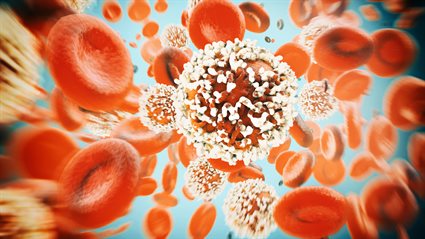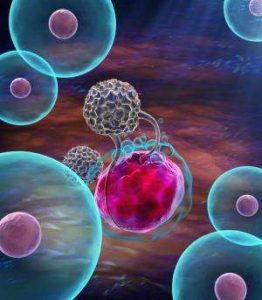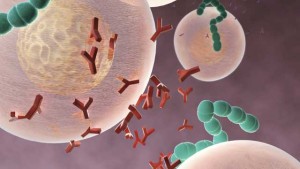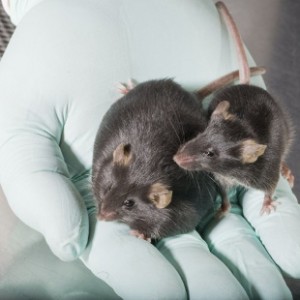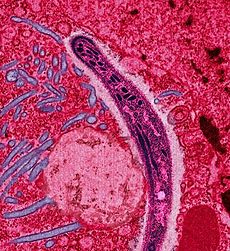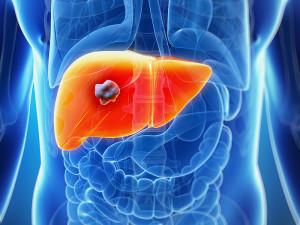Highlights
- •Covalent K-Ras(G12C) inhibitors give rise to chemically modified cancer neoepitopes
- •Antibodies against these neoepitopes are identified by phage display
- •Bispecific antibodies induce T cell-mediated killing of KRAS G12C mutant cells
Summary
Immunotargeting of tumor-specific antigens is a powerful therapeutic strategy. Immunotherapies directed at MHC-I complexes have expanded the scope of antigens and enabled the direct targeting of intracellular oncoproteins at the cell surface. We asked whether covalent drugs that alkylate mutated residues on oncoproteins could act as haptens to generate unique MHC-I-restricted neoantigens. Here, we report that KRAS G12C mutant cells treated with the covalent inhibitor ARS1620 present ARS1620-modified peptides in MHC-I complexes. Using ARS1620-specific antibodies identified by phage display, we show that these haptenated MHC-I complexes can serve as tumor-specific neoantigens and that a bispecific T cell engager construct based on a hapten-specific antibody elicits a cytotoxic T cell response against KRAS G12C cells, including those resistant to direct KRAS G12C inhibition. With multiple K-RAS G12C inhibitors in clinical use or undergoing clinical trials, our results present a strategy to enhance their efficacy and overcome the rapidly arising tumor resistance.
Introduction
Targeting of tumor- or tissue-specific cell surface antigens is a central tenet of antibody-based (Bargou et al., 2008), cell-based (June et al., 2018), and chemically mediated cancer immunotherapy (McEnaney et al., 2012). While the search for such tumor-specific cell surface antigens has been extensive (Schumacher and Schreiber, 2015), few have been identified over the last 30 years. Oncogenic driver mutations, by contrast, are very common and are exclusively expressed in tumor cells but not normal tissues. However, the vast majority of mutant oncoproteins are intracellular and thus beyond the reach of antibody-based therapeutic modalities. Targeting oncogene-derived peptide fragments (neoantigens) presented by class I major histocompatibility complex (MHC class I) using T cell receptor-mimicking antibodies is a promising strategy (Chang et al., 2017; Dao et al., 2013; Hsiue et al., 2021; Li et al., 2017; Low et al., 2019), but it is challenging to identify antibodies specific for a single amino acid substitution in the context of a particular MHC class I (human leukocyte antigen [HLA]) allele. Somatic mutations that introduce a cysteine residue, such as KRAS p.G12C, that can be covalently targeted by cell-permeable drugs provide an opportunity for simplified antibody recognition of cancer cells. If the covalently modified K-Ras(G12C) oncoprotein could undergo antigen processing and presentation, then it would produce peptide-MHC class I complexes that contain the drug as a molecular feature (hapten) readily recognizable by therapeutic antibodies. In addition, the formation of these MHC class I complexes would benefit from increased MHC class I expression as a result of K-Ras inhibition (Canon et al., 2019; Yamamoto et al., 2020).
Here, we report that covalent modification of K-Ras(G12C) at the tumor-specific cysteine results in the presentation of haptenated peptides by MHC class I. Using a naive human Bcell-derived Fab (fragment antigen binding)-phage library (Duriseti et al., 2010), we identified a recombinant antibody, P1A4, that specifically recognizes K-Ras(G12C)-derived peptides modified by the investigational inhibitor ARS1620. A bispecific T cell engager (BiTE) constructed from this antibody clone selectively induced a cytolytic T cell response that killed ARS1620-resistant KRAS G12C mutant cells in vitro. Our study demonstrates that MHC class I peptides derived from covalently modified intracellular proteins provide a unique source of tumor-specific neoantigens that require the presence of a somatic KRAS G12C mutation and its modification by a covalent K-Ras G12C-specific drug. These neoantigens, bearing a distinct chemical modification, can be readily targeted with an immune cell killing modality that overcomes tumor resistance to direct target inhibition.
Results
ARS1620 modified K-Ras G12C peptides are competent for antigen presentation
KRAS G12C is one of the most prevalent oncogenic driver mutations in lung and colon cancer (Prior et al., 2012). While covalent inhibitors (e.g., sotorasib/AMG510 [Canon et al., 2019; Fakih et al., 2019], adagrasib [Papadopoulos et al., 2019], JNJ-74699157 [Janssen Research & Development, 2020], LY3499446 [Eli Lilly and Company, 2021], ARS1620 [Janes et al., 2018]) that specifically react with the acquired cysteine (Cys12) residue have been reported to rapidly engage cellular K-Ras(G12C) proteins and drive tumor regression in mouse models and clinically (Fakih et al., 2019; Janes et al., 2018), not all patients with a KRAS G12C mutation respond to K-Ras(G12C) inhibitors (Canon et al., 2019; Fakih et al., 2019). Clinical resistance to both sotorasib and adagrasib have already been observed (Awad et al., 2021; Koga et al., 2021; Tanaka et al., 2021), with various mechanisms including mutations on the wild-type (WT) KRAS allele in trans. However, most resistant tumors retain the expression of KRAS G12C (Awad et al., 2021). Therefore, an immunotherapy that targets the KRAS G12C mutation would likely circumvent these resistance mechanisms and benefit a large patient population…

